When a former manager suggested I use a flowchart for brainstorming, I laughed in his face. Wasn’t that like drafting War and Peace in Excel? How can haunted memories of geometry help me plan a social media campaign?
But then I saw it: the misshapen rectangle on my page was an overarching theme. And the blobby circle below that was a good post idea. I could draw another idea, and another…
Whether you call it a flowchart, diagram, or mind map, these are the best diagramming tools to get your creative juices (or boring organizational charts) flowing.
The 8 best flowchart software and diagram tools
What makes the best flowchart and diagramming software?
How we evaluate and test apps
Our best apps roundups are written by humans who’ve spent much of their careers using, testing, and writing about software. Unless explicitly stated, we spend dozens of hours researching and testing apps, using each app as it’s intended to be used and evaluating it against the criteria we set for the category. We’re never paid for placement in our articles from any app or for links to any site—we value the trust readers put in us to offer authentic evaluations of the categories and apps we review. For more details on our process, read the full rundown of how we select apps to feature on the Zapier blog.
Working in marketing agencies for over ten years means I’ve seen my fair share of flowcharts, wireframes, diagrams, and mind maps in everything from website or campaign planning to brainstorming and creative ideation. Even now as a freelancer, I love visually organizing my thoughts when beginning a project.
To test these flowchart apps, I signed up for either a free account or trial of each and started one or more projects the way I normally would in my workflow. I tested the basic functionality of these flowchart apps, as well as advanced features like collaboration (using another account), AI prompts, and data syncing.
In my opinion, these are the five most important features a good diagramming tool must have:
-
Easy to use: Whether you’re creating simple org charts or complex network diagrams with self-updating connected databases, a flowchart or diagram app should be easy to get started with right away.
-
Templates: Having a large library of templates saves time and allows everyone to make aesthetically pleasing, professional flowcharts.
-
Team collaboration: Real-time team collaboration is a must, especially for remote teams and for sharing projects with clients.
-
AI and other advanced features: Not all of these apps have specific artificial intelligence (AI) features, but they each offer something unique to a specific set of users that other apps don’t. Depending on your needs, that could be a deciding factor for you.
-
Value for price: Cheapest isn’t always best. These flowchart and diagram apps range widely in price, though all present a good value for their specialty.
Alright, let’s get these nodes on the road. I’ve been updating this article for several years, and this year, after weeks of extensive testing, these are the best flowchart software and diagram apps.
The best flowchart and diagram software at a glance
|
Best for |
Standout features |
Pricing |
|
|---|---|---|---|
|
Advanced functionality |
Cross-platform compatibility; Google Sheets data syncing |
Free for up to 3 documents; paid plans from $9/month |
|
|
Microsoft 365 and Windows users |
Deep integration with Microsoft Office 365 and Teams; accessibility features |
From $5/user/month for the web version |
|
|
Diagramming business processes |
AI-powered workflow suggestions |
Free while in open beta |
|
|
AI-powered productivity |
Best-in-class AI tools built-in; supports Visio format |
From $15.90/month |
|
|
All-in-one remote team workspace |
Team meetings, documents, projects, and more—everything needed for remote work |
Free up to 3 boards; paid plans from $8/user/month |
|
|
Generating charts from text or code |
Fastest diagram tool for those familiar with syntax; AI chart creation |
Free up to 5 diagrams; paid plans from $6.67/user/month |
|
|
A free diagramming tool |
Advanced features of “the big guys” for free; Confluence plugin for sharing |
Free |
|
|
UX design and wireframing |
UX and UI templates; interactive prototypes; approval workflows |
Free up to 2 projects; paid plans from $17/month |
Best diagram software for advanced functionality
Lucidchart (Windows, macOS, Linux, iPadOS, iOS, Android, Web)
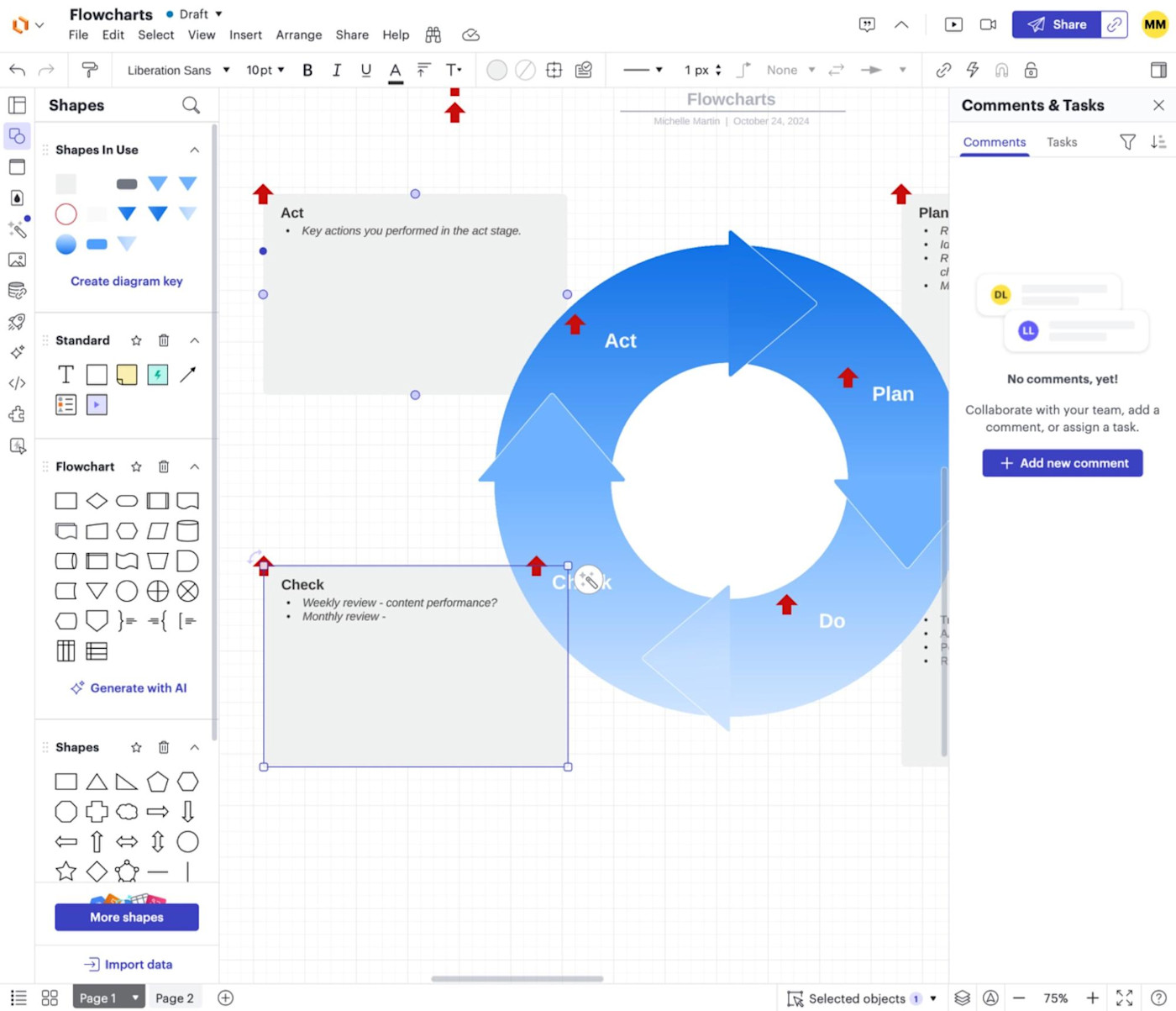
Lucidchart pros:
Lucidchart cons:
Lucidchart is widely seen as the “industry standard” flowchart/diagram software, and I can see why. The feature set is impressive, but the interface never feels overwhelming as a new user. Everything is organized and works as you’d expect: click and drag shapes and tools into your canvas, and access tooltips and help sections from anywhere.
This Microsoft Visio alternative makes it easy to switch from Visio because of its familiar Windows-inspired toolbar and menus. You can even import and export Visio format files for max compatibility, or to replace Visio entirely.
If you’re a Windows user who only makes occasional diagrams, Lucidchart’s Visio compatibility and free plan for up to three projects may be all you need. Plus, if you collaborate with coworkers or clients who use Macs, Lucidchart’s cross-platform compatibility and online Team Hubs are a must-have.
Speaking of collaboration, real-time editing works as expected. You can invite anyone to collaborate in the web version via email, and multiple editors can live-edit in the same document. Unlike Microsoft Visio, collaborators don’t need their own Lucidchart subscription to contribute. Combined with advanced data syncing from Google Sheets, CSV, and other sources and the per-user pricing structure, Lucidchart is equally suitable for small or large companies wanting the best mix of compatibility and pro features that won’t break the bank.
You can expand Lucidchart’s functionality even more with Zapier integrations to connect it to thousands of apps. Automate customer service tasks, keep data synced, and much more. Here are some examples to get you started.
Lucidchart pricing: Free for up to 3 documents. Premium plans start at $9/month for individuals and $10/user/month for teams (minimum 3 users).
Best diagram software for Microsoft 365 and Windows users
Microsoft Visio (Windows, Web)
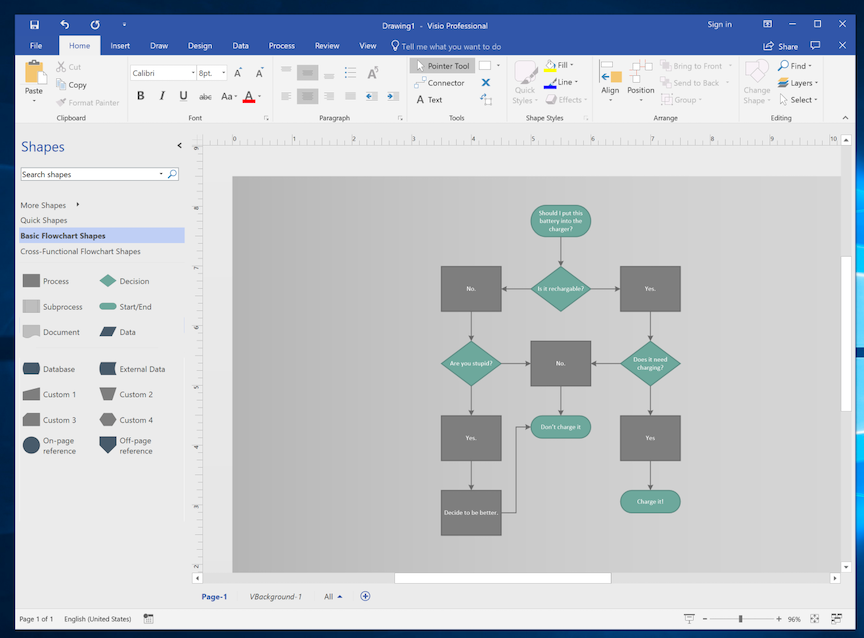
Microsoft Visio pros:
-
Made for Windows users
-
Deep integration with Microsoft 365 tools, such as Word and Excel
-
Real-time collaboration in Microsoft Teams meetings
Microsoft Visio cons:
Full stop: if you and everyone who needs to edit or access your diagrams uses Windows computers and/or Microsoft 365, Visio is your best flowchart software choice.
Deep integration with Microsoft Office 365 and Teams means you can work inside Visio on a video call, including non-Windows users in the web app version. Keep in mind, though, that all editors must have their own Visio subscription to edit files. Non-Visio users can leave feedback and notes, though this isn’t ideal for many remote teams.
Another limitation for non-Windows users is you can’t link data sources in the web version. If creating synced or data-powered diagrams or charts is important to you, it’s best to stick to a multi-platform solution like Lucidchart.
Because of the ease of sharing across other Microsoft programs, including using OneDrive for cloud storage, Visio easily becomes embedded into your business management tech stack instead of being “just a flowchart app.” For the right Microsoft 365-focused organization, this seamless integration is an overlooked benefit. For everyone else… well, you wish Visio would move out of Mama Windows’ basement already.
One area Microsoft Visio does exceptionally well is accessibility. Visio offers text-to-speech reading out loud as well as high contrast support for visually impaired people. If those features make work easier or faster for you, Visio is worth it for those alone.
Visio pricing: $5/user/month for web or $15/user/month for web and native apps. Also included with Microsoft Office 365 Commercial.
Best flowchart software for diagramming business processes
Zapier Canvas
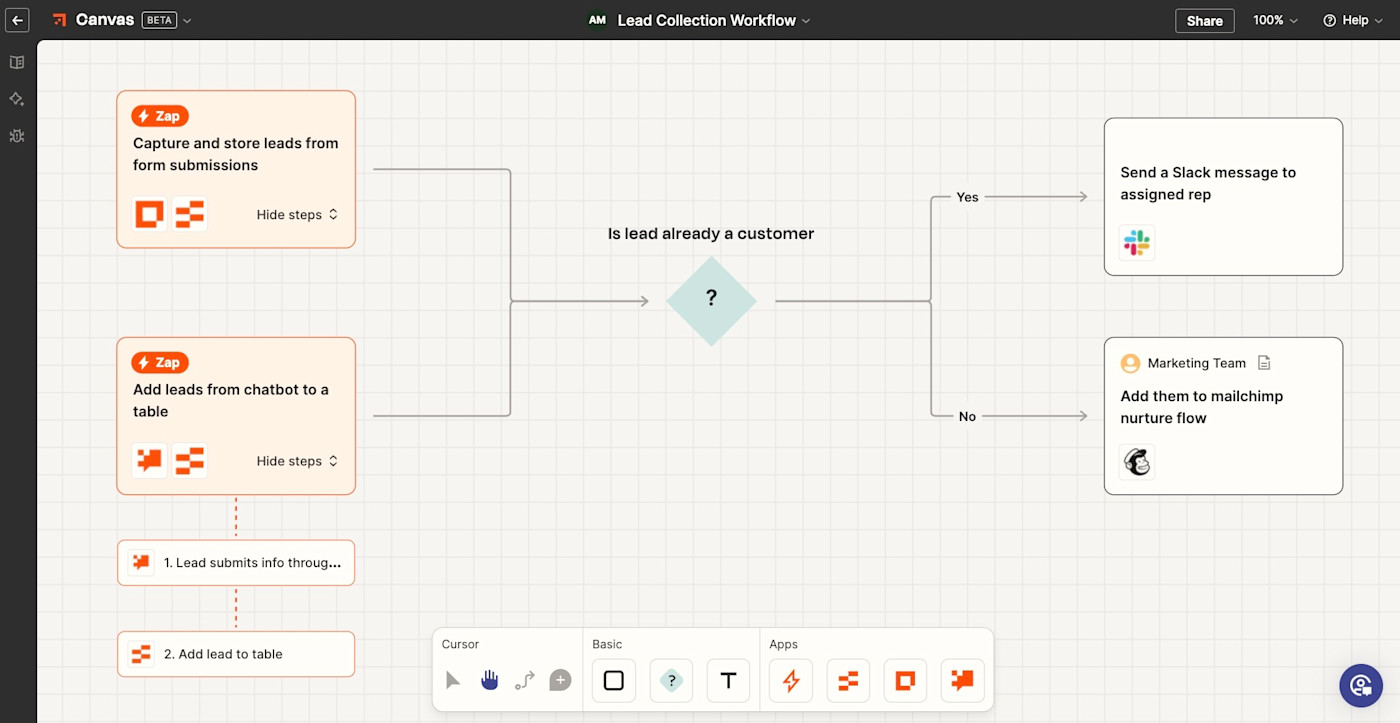
Zapier Canvas pros:
-
Map out workflows and put them into action with the same tool
-
Share, collaborate, and gather feedback before automating
-
Find the most efficient automations with Zapier’s AI workflow analysis
Zapier Canvas cons:
Canvas is a Zapier product, and you’re on the Zapier blog right now, so I appreciate any skepticism. But Zapier Canvas is the app you’re looking for if you’re having trouble mapping out your business workflows.
It’s a diagramming tool that lets you visualize, plan, and create automated processes—all in one tool. That last part is key: once you’ve mapped out your processes, including which apps you’ll use to make them work, you can automate them right on the same platform.
Zapier has also added a healthy dose of AI into the mix. With built-in AI, Canvas helps you discover more automation opportunities and quickly transform ideas and plans into actual processes.
You’ll map out your ideas with Zapier’s available tools and integrations, share plans with stakeholders (who can leave feedback), and refine your workflow before you begin building. When you’re ready to start automating, you can use AI to draft a Zap (Zapier’s term for an automated workflow) that’s the most efficient route to your destination.
If you still need a pinch of salt to believe me, try it yourself for free.
Zapier Canvas price: Free while in open beta
Best diagram software for AI-powered productivity
EdrawMax / Edraw.AI (Windows, macOS, Linux, iOS, Android, Web)
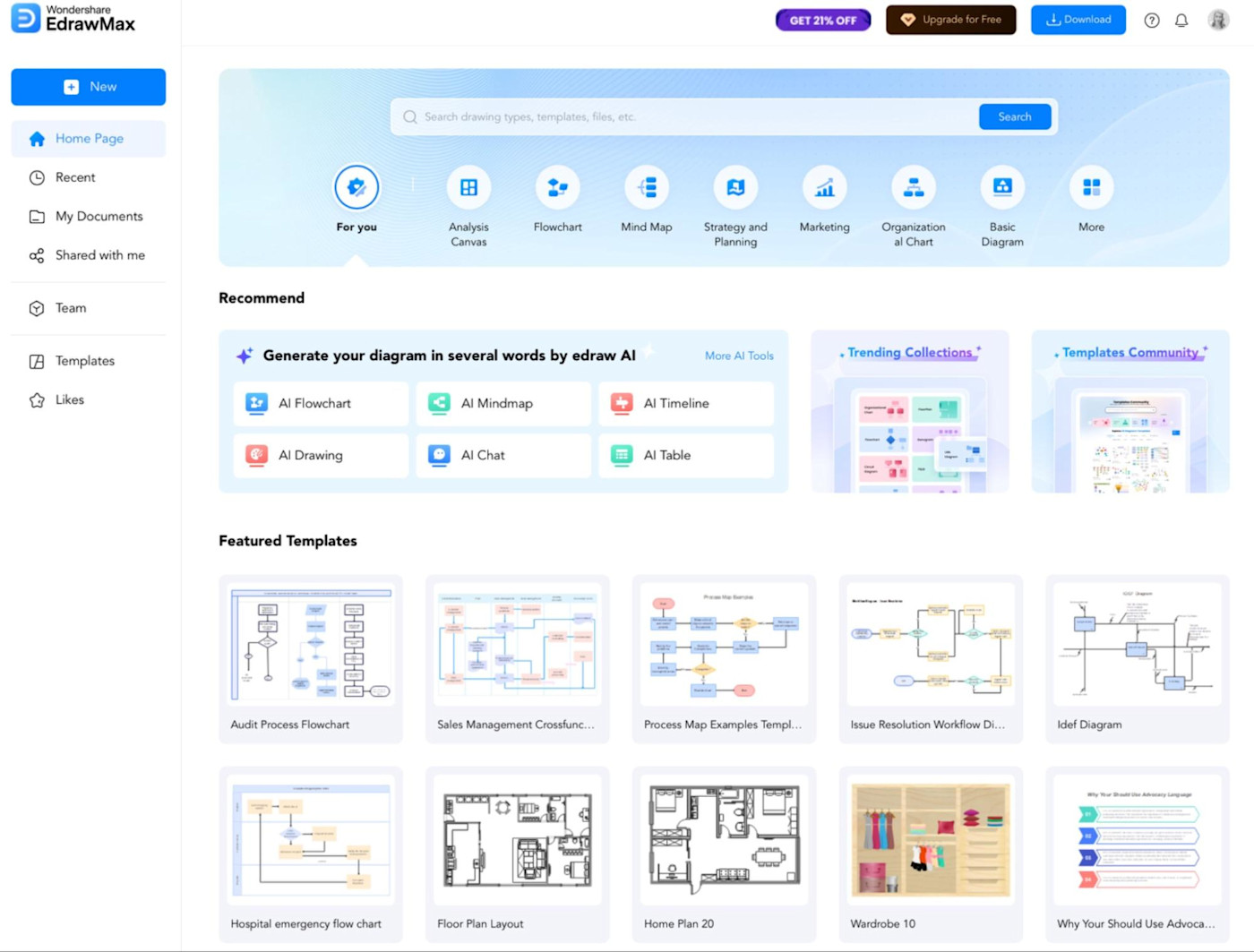
EdrawMax pros:
-
All the advanced diagramming functions you need, plus best-in-class AI productivity tools
-
Intuitive, easy-to-use editing layout
EdrawMax cons:
There are plenty of diagramming apps with powerful AI features, but if you’re looking for flowchart software with the best AI productivity tools, EdrawMax is it.
Besides assisting with diagram creation, EdrawMax can summarize files and documents, pull text out of images, edit images, generate reports and images, write copy, and create entire diagrams in the style you select from text prompts. It’s easy to get a draft of a diagram in just a few clicks that you can edit with all the expected manual tools, speeding up the diagramming process exponentially.
When using EdrawMax, the biggest thing that stood out to me was how it combines advanced features that the “big guys” (like Lucidchart and Visio) have with useful AI tools to do everything from draft charts to website copy and image generation, too. There’s a lot to unpack in EdrawMax, including some really unique features like the ability to embed diagrams into your site with HTML. With support for Microsoft Visio format, you can upload and edit Visio files, plus collaborate in real-time with your team, apply one-click design styles, and create multi-page files to keep charts organized.
If you want just one business tool for your entire team to create diagrams and speed up their work with AI tools, rather than paying for many separate, specialized AI app subscriptions, EdrawMax is the powerhouse you want.
EdrawMax pricing: $15.90/month, $69/6 months, $99/year, or $245 one-time for lifetime access for individuals. Team plans start at $238/year for 2 users.
Best diagram software for an all-in-one remote team workspace
Miro (Windows, macOS, Windows Displays, iOS, Android, Web)
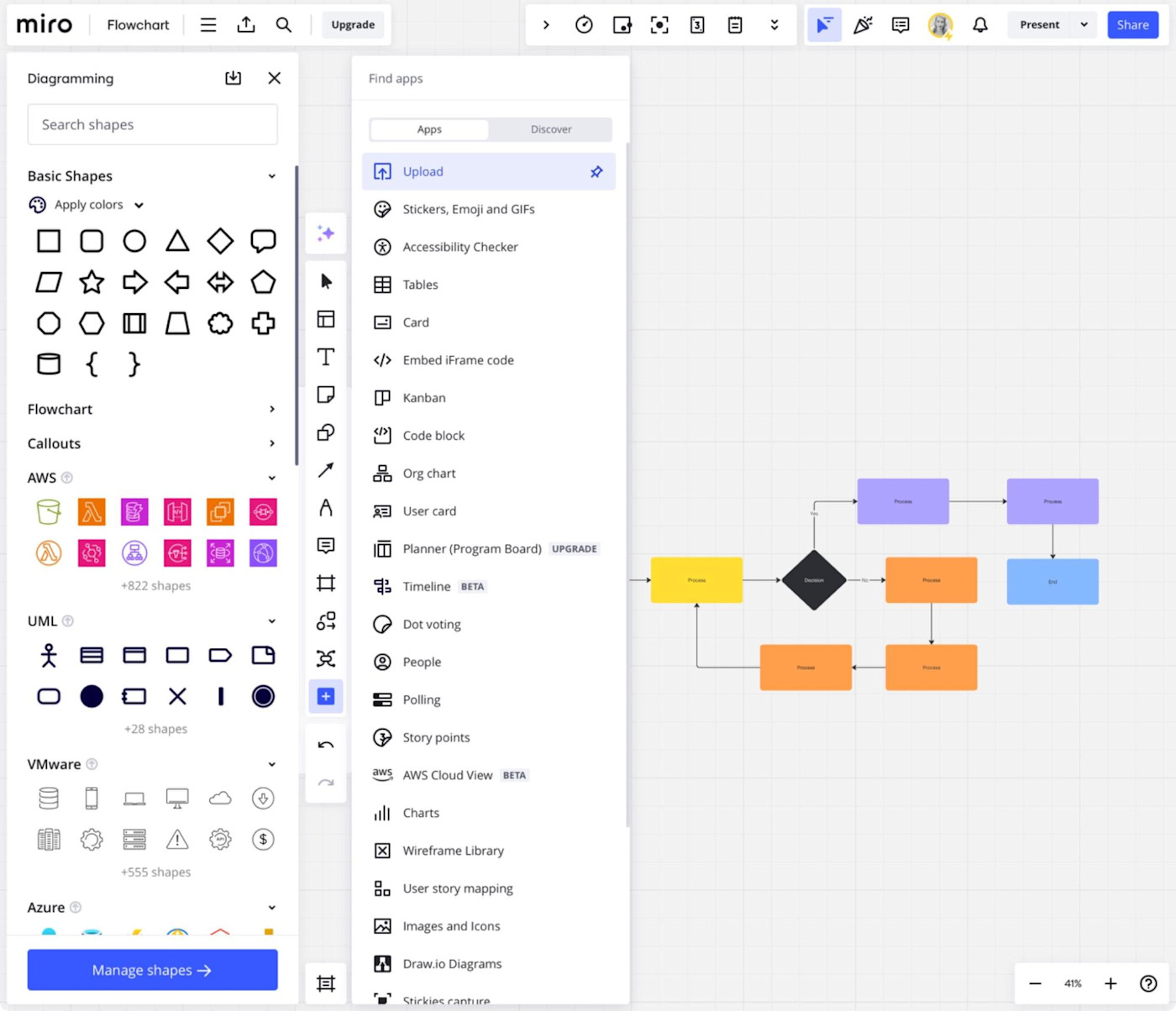
Miro pros:
-
Every tool remote working teams need in one app, including diagramming, meetings, documents, generative AI tools, and more
-
It’s honestly a perfect app (I never say this!)
Miro cons:
You probably use some sort of project management app at your organization already. Most likely also a meeting tool, cloud storage solution, and online documents app like Google Docs or similar for remote team collaboration. Even with those basic business needs, that could easily be five or more separate app subscriptions you’re paying for.
If you need all of that and diagramming… say hello to a Miro-cle.
My favorite way to use Miro is actually as a brainstorming and planning tool. The whiteboard-style layout makes individual or collaborative research and work easy, all in an aesthetically-pleasing, minimal-yet-functional layout sure to be a hit with nerds and the designer-minded alike.
Miro is an essential planning and meeting tool for any organization with a remote work model. There’s so much packed into this app, I can’t begin to cover it in just a few paragraphs.
And besides a marketplace with over 100 integrations to top business apps and a public template library, Miro also connects to thousands of apps with Zapier. Seamlessly set up automatic workflows like these, and many more.
If that weren’t enough, Miro has added extensive AI capabilities this year, including generative AI for prompt-to-chart functionality, and a unique “AI Expert” mode. No other app I tested has this. Basically, if you’re working on a marketing plan, you can summon an AI chatbot who is a marketing expert to offer suggestions on your work or ask questions. It’s tailored to what you’re working on, and while the suggestions I received on my test marketing plan were fairly basic, they were helpful, making this far from a gimmicky feature. You can also draft content, proofread and edit grammar, translate text, and build shortcuts with AI to speed up workflows.
If I could marry an app, it would be Miro. Yep, I said it.
Miro pricing: Get 3 boards for free. Starter plan is $8/user/month for unlimited boards, meetings, and premium features. The Business plan for $16/user/month includes unlimited private workspaces, advanced meeting tools, more templates, and more.
Best diagram software for generating charts from text or code
Mermaid Chart (Web)
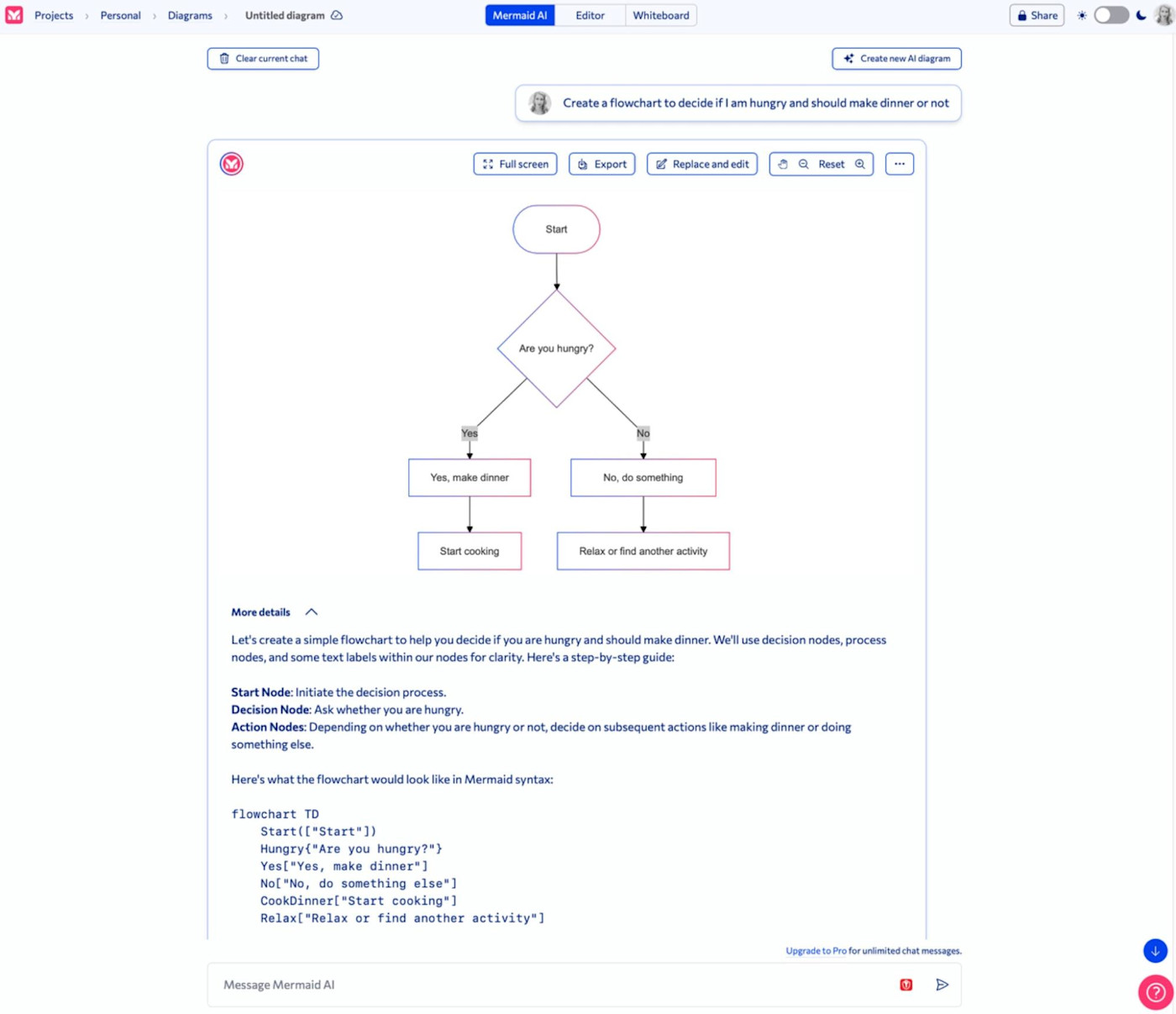
Mermaid Chart pros:
Mermaid Chart cons:
You won’t be drowning in deadlines with Mermaid Chart’s rapid text-to-chart features. The aptly named tool understands Mermaid, a programming syntax similar to Markdown, to turn text or code commands into diagrams and charts.
For those already familiar with Mermaid syntax, you can create charts in seconds. For those who aren’t, you can learn it in a day. Or don’t use it at all, and still harness the time-saving benefits by creating charts with AI from text prompts.
Many flowchart apps also incorporate AI prompting, but Mermaid is one of the few tools aimed at text-first thinkers that combines Markdown-style chart creation and AI in the same app, while also still offering visual editing tools for the charts it creates.
Personally, I like the appeal of creating a chart quickly with text prompts but then fine-tuning it in Mermaid Chart’s visual editor. Add in handy tools like one-click design themes, templates, and real-time collaboration, and you have a well-rounded, yet lightweight, flowchart app capable of working equally well for wordy or visual thinkers.
Mermaid Chart pricing: Free version is limited to 5 diagrams without sharing features. Premium plans are $6.67/user/month for all features, or $17/user/month for enhanced Enterprise features.
Best free diagram and flowchart software
yEd (Windows, macOS, Linux, Web, Confluence Plugin)
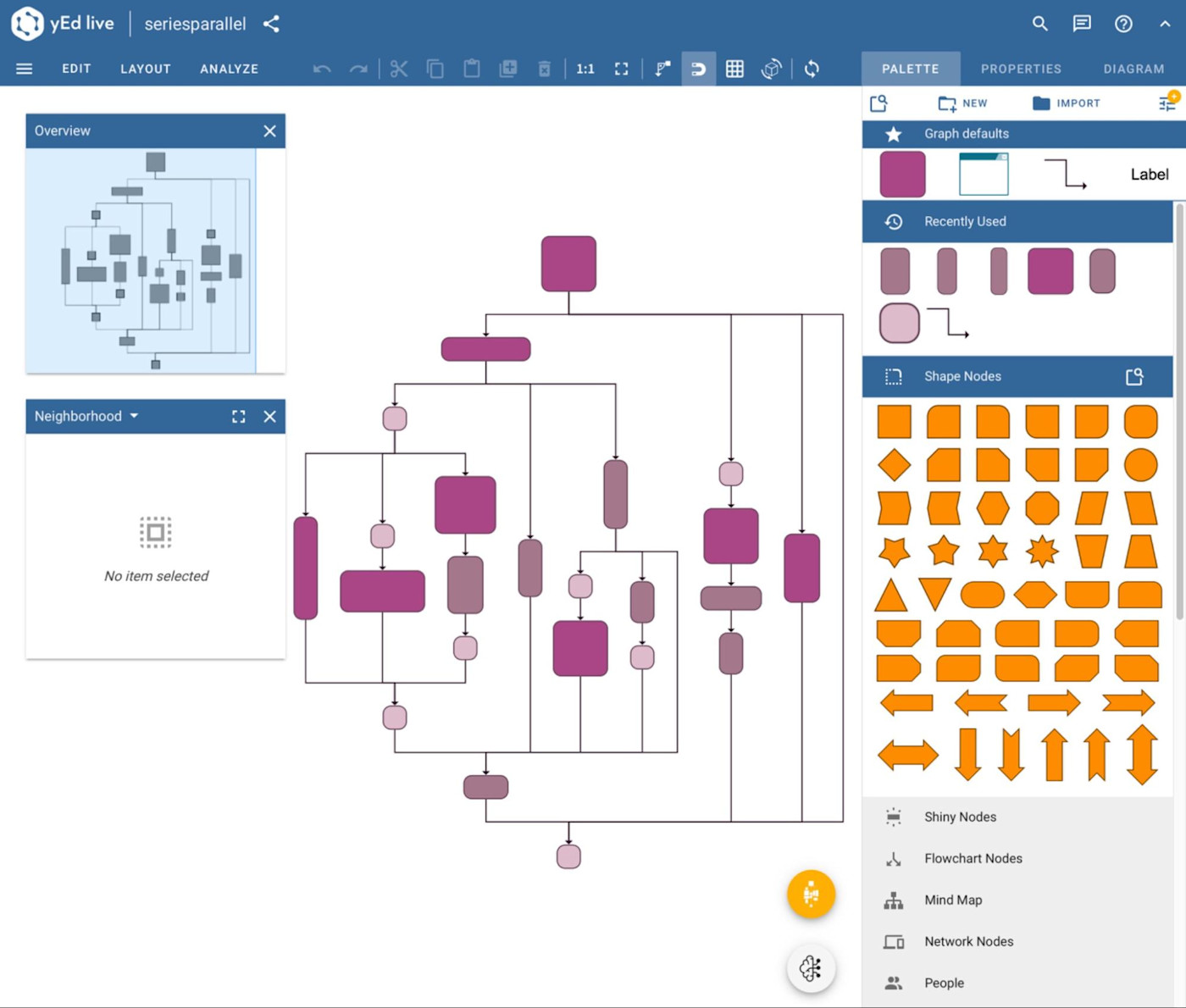
yEd pros:
yEd cons:
A free diagramming tool with AI chart creation features, team collaboration, data import, and cross-platform compatibility? If my eyebrows were a bar graph, they’d be all the way up the Y-axis.
The look of yEd is a little outdated, but if budget is tight, it offers all the features you could ever want in both dedicated desktop apps and a web version.
yEd has plenty of little bonus features that don’t sound particularly impressive on paper but make a big difference in use, such as the ability to have multiple diagrams open at once, customizable settings and layouts, custom icons, and multiple automatic chart layout options for instantly tidy diagrams.
Like the big guys, you can start a diagram from a text prompt with the ChatGPT integration, import data from multiple formats, including Excel, and create all types of diagrams with a built-in icon and template library. The only drawback to yEd is that real-time collaboration is only possible with the Confluence plugin version, though the web and desktop apps allow you to export and save your work multiple ways. For the price, and especially if you use Confluence as a team, yEd is still a great diagram app.
yEd pricing: Free
Best diagram software for UX design and wireframing
Moqups (Web, Chrome and Firefox Extensions, Confluence and Jira plugins)
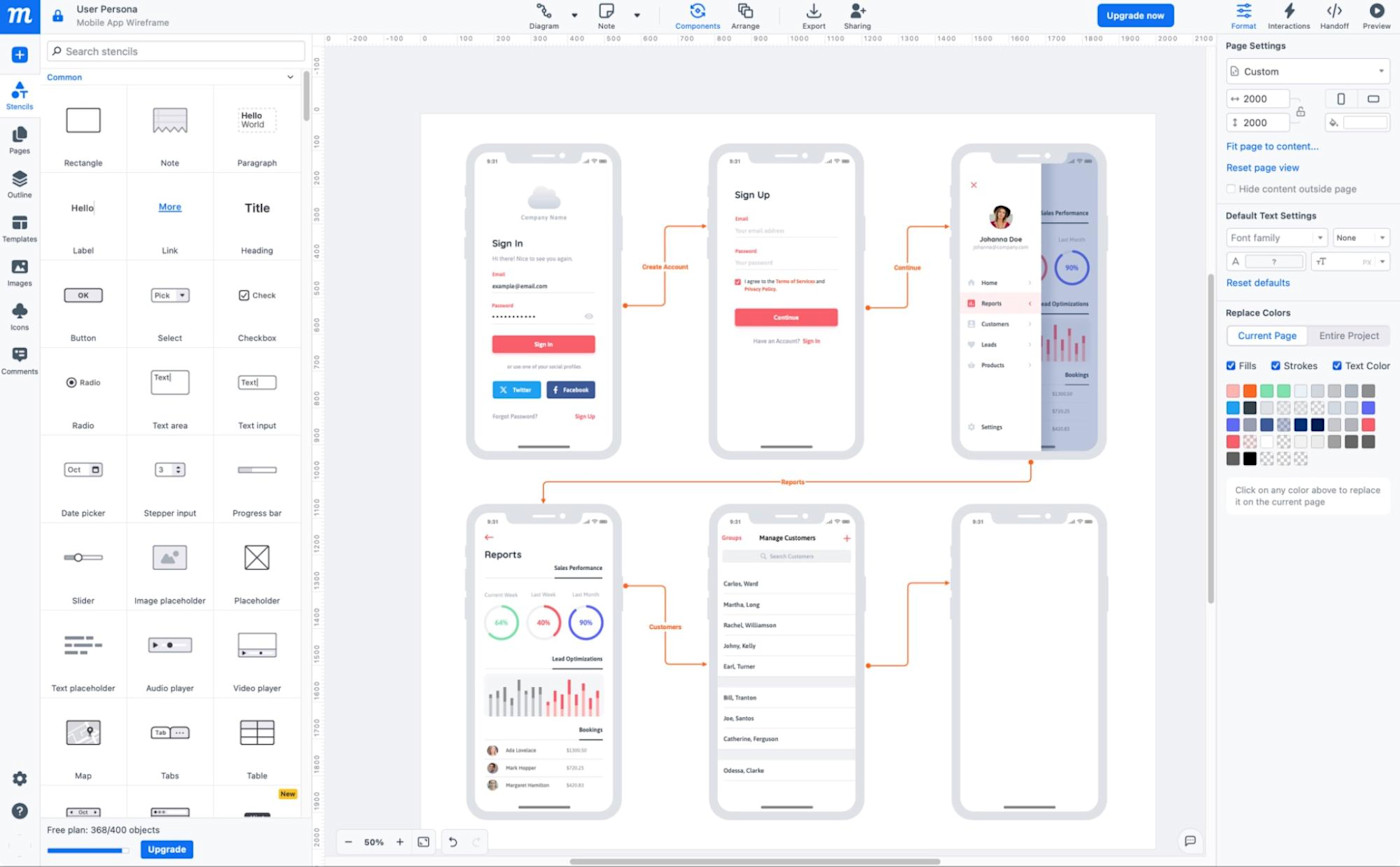
Moqups pros:
Moqups cons:
While you can make any type of diagram in Moqups, it excels at UX and wireframing for digital agencies or software development teams.
It’s got everything you care about: drag-and-drop diagram creation, attractive templates, and extensive sharing and collaboration options for working remotely with clients or your team, complete with customizable roles, permissions, and a chat space.
You can easily create mind maps, flowcharts, and more in Moqups, though unlike more general diagramming apps, Moqups is meant for UX and design teams. Start from an included website, UI, or app template, or turn an existing project into a custom template. Besides real-time editing and notation within projects, each team space also has whiteboarding and chat features for brainstorming, collecting research and inspiration, and running presentations via video conference.
While Moqups lacks generative AI tools found in other apps on this list, it more than makes up for it with smart wireframing tools, including the ability to turn your projects into live, interactive prototypes to streamline development, get client buy-in, and present your ideas quickly.
Moqups pricing: Free for 2 projects. Premium plans are $17/month for individuals, $32/month for teams up to 5 people, and $89/month for unlimited teams and users.
Honorable mentions
These apps came close to making the list, so I wanted to be sure to give them a shout-out here.
-
Creately combines diagramming with overall business management, including projects and tasks, collaboration, and meetings—much like Miro—at a fraction of the cost.
-
FigJam is the most fun collaborative brainstorming, meeting, and diagramming tool that can be used alone, and it integrates perfectly with Figma.
-
Lekh is the best flowchart app for tablet users, both iPad and Android, and mobile devices.
-
Apple Freeform is free and built into all Apple devices with effortless syncing and an open, brainstorm-focused canvas. It lacks some advanced diagramming tools but is perfect for simple charts on the go.
-
SmartDraw is the fastest diagramming app I tested with one-click nodes and auto-layout options to keep charts organized, plus extensive data import and visualization tools.
-
Mural has the most aesthetic templates, hands down. For unique and well-designed templates for any type of chart, Mural helps you present your best work.
-
SketchWow is more of a graphic design tool, but you can create simple charts and diagrams in a hand-drawn style to make your presentations and files truly unique.
-
Zen Flowchart is your answer to, “Do I even need [this feature]?” Purpose-built for simplicity, this app is just for making nice diagrams and charts. No other funny business.
Which diagram and flowchart app is best for you?
Is there ever a perfect app in any category? Usually not, though I believe these are the best diagram and flowchart software options for most types of people.
To decide, make a list of your must-have features first and eliminate anything that doesn’t provide those. That way you’re only left with good options: an enviable place to be.
End of article.
↓
Go make a diagram.
↓
Now.
↓
Reader exit.
Related reading:
This article was originally published in December 2018 by Justin Pot and has also had contributions from Maria Bell. The most recent update was in November 2024.